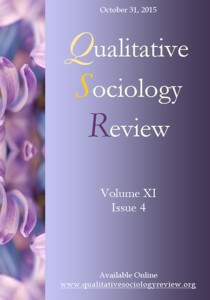Storying the Good Life: Selfhood and Morality Through the Biographical Narrative Storyline
DOI:
https://doi.org/10.18778/1733-8077.11.4.04Keywords:
Life Stories, Narrative Analysis, Morality, Self, Cultural Change, Generations, Storyline, Moral MotivesAbstract
The connection between personal story and morality has been long enunciated, but remains under-researched. Combining moral and narrative theory, this article approaches this relation by introducing a line of narrative inquiry oriented towards the exploration of how ethical intentions with regard to the good life manifest in and shape the biographical storyline and the self narratively assembled. The analysis encompasses a first case-based stage focused on the examination of the main motive of the personal story and its effects upon the organization of both self and narrative, followed by a comparative phase in which storylines and moral motives that work as reference of a set of biographical accounts belonging to different social positions, temporalities, or geographies are contrasted in order to establish linkages, breaks, and transformations in the relation between identity and morality across cases. This line of inquiry is applied into a research about intergenerational changes and continuities in the relation between selfhood and morality, based on life stories conducted with Chilean people of successive generations. In the conclusions, this strategy of narrative analysis is assessed in the light of current development of this field of qualitative social research.
Downloads
References
Andrews, Molly et al. 2000. “Narrative Research.” Pp. 109-124 in Qualitative Research Practice, edited by C. Seale et al. London: Sage.
Google Scholar
Bernasconi, Oriana. 2010. “Being Decent, Being Authentic: The Moral Self in Shifting Discourses of Sexuality Across Three Generations of Chilean Women.” Sociology 44(5):860-875.
Google Scholar
DOI: https://doi.org/10.1177/0038038510375741
Bernasconi, Oriana. 2011. “Negotiating Personal Experience Over the Lifetime: Narrative Elasticity as an Analytic Tool.” Journal of Symbolic Interaction 34(1):20-37.
Google Scholar
DOI: https://doi.org/10.1525/si.2011.34.1.20
Corsten, Michael. 1999. “The Time of Generations.” Time and Society 8(2):249-272.
Google Scholar
DOI: https://doi.org/10.1177/0961463X99008002003
Cortazzi, Martin. 2008. “Narrative Analysis in Ethnography.” Pp. 384-394 in Handbook of Ethnography, edited by P. Atkinson et al. Los Angeles, London, New Delhi, Singapore: Sage.
Google Scholar
DOI: https://doi.org/10.4135/9781848608337.n26
Day Sclater, Shelley. 2001. “What Is the Subject?” Paper presented at the Narrative and Psychology Symposium, British Psychology Society Centenary Conference, Glasgow, UK.
Google Scholar
Edmunds, June and Bryan Turner. 2002. Generations, Culture, and Society. Buckingham: Open University Press.
Google Scholar
Frank, Arthur. 1995. The Wounded Storyteller: Body, Illness, and Ethics. Chicago: University of Chicago Press.
Google Scholar
DOI: https://doi.org/10.7208/chicago/9780226260037.001.0001
Gergen, Kenneth. 1991. The Saturated Self: Dilemmas of Identity in Contemporary Life. New York: Basic Books.
Google Scholar
Goffman, Erving. 1972. The Presentation of Self in Everyday Life. London: Penguin Books.
Google Scholar
Holstein, James and Jaber Gubrium. 2000. The Self We Live By: Narrative Identity in a Postmodern World. Oxford: Oxford University Press.
Google Scholar
Kertzer, David. 1983. “Generation as a Sociological Problem.” Annual Review of Sociology 9:125-149.
Google Scholar
DOI: https://doi.org/10.1146/annurev.so.09.080183.001013
Kohli, Martin. 1996. “The Problem of Generation: Family, Economy, Politics.” Collegium Budapest, Institute for Advanced Study. Lectures no. 14, November.
Google Scholar
Labov, William. 1982. “Speech Actions and Reactions in Personal Narrative.” Pp. 219-247 in Analyzing Discourse: Text and Talk, edited by D. Tannen. Washington, DC: Georgetown University Press.
Google Scholar
MacIntyre, Alasdair. 1984. After Virtue. Notre Dame: University of Notre Dame Press.
Google Scholar
Mannheim, Karl. 1952. “The Problem of Generations.” Pp. 276-322 in Essays in the Sociology of Knowledge, edited by P. Kecskemeti. Routledge and Kegan Paul.
Google Scholar
Ochs, Elinor and Lisa Capps. 2001. Living Narrative. Creating Lives in Everyday Storytelling. Cambridge, MA: Harvard University Press.
Google Scholar
Parker, David. 2007. The Self in Moral Space: Life Narrative and the Good. Ithaca, London: Cornell University Press.
Google Scholar
DOI: https://doi.org/10.7591/9781501732287
Pilcher, Jane. 1994. “Mannheim’s Sociology of Generations: An Undervalued Legacy.” British Journal of Sociology 45: 481-495.
Google Scholar
DOI: https://doi.org/10.2307/591659
Plummer, Ken. 2001. Documents of Life 2: An Invitation Into a Critical Humanism. London: Sage.
Google Scholar
Ricoeur, Paul. 1992. Oneself as Another. Chicago, London: University of Chicago Press.
Google Scholar
Riessman, Catherine. 2008. Narrative Methods for the Human Sciences. London, Thousand Oaks: Sage.
Google Scholar
Rose, Nikolas. 1999. Governing the Soul. London, New York: Free Association Books.
Google Scholar
Schatzman, Leonard and Anselm Strauss. 1973. Field Research: Strategies for a Natural Sociology. Englewood Cliffs, NJ: Prentice-Hall.
Google Scholar
Schütz, Alfred. 1967. The Phenomenology of the Social World. Evanston, IL: Northwestern University Press.
Google Scholar
Smith, Brett and Andrew C. Sparkes. 2008. “Narrative and Its Potential Contribution to Disability Studies.” Disability & Society 23(1):117-128.
Google Scholar
DOI: https://doi.org/10.1080/09687590701725542
Squire, Corinne. 2005. “Reading Narratives.” Group Analysis 38(1):91-107.
Google Scholar
DOI: https://doi.org/10.1177/0533316405049373
Stanley, Liz. 2008. “Madness to the Method? Using a Narrative Methodology to Analyze Large-Scale Complex Social Phenomena.” Qualitative Research 8(3):435-447.
Google Scholar
DOI: https://doi.org/10.1177/1468794106093639
Taylor, Charles. 1985a. “The Person.” Pp. 257-281 in The Category of the Person: Anthropology, Philosophy, History, edited by M. Carrithers, S. Collins, and S. Lukes. Cambridge: Cambridge University Press.
Google Scholar
Taylor, Charles. 1985b. “Connolly, Foucault, and Truth.” Political Theory 13(3):377-385.
Google Scholar
DOI: https://doi.org/10.1177/0090591785013003005
Taylor, Charles. 1989. Sources of the Self: The Making of the Modern Identity. Cambridge, MA: Harvard University Press.
Google Scholar
Taylor, Charles. 1992. Ethics of Authenticity. Cambridge, MA: Harvard University Press.
Google Scholar
Urresti, Marcelo. 2007. “De la cultura del aguante a la cultura del reviente: cambios en la significación de la corporalidad en adolescentes y jóvenes de sectores populares.” Pp. 281-305 in Familia, Hábitat y Sexualidad en Buenos Aires, edited by M. Margulis, M. Urresti, and H. Lewin. Buenos Aires: Editorial Biblos.
Google Scholar
Downloads
Published
How to Cite
Issue
Section
License

This work is licensed under a Creative Commons Attribution-NonCommercial-NoDerivatives 4.0 International License.











